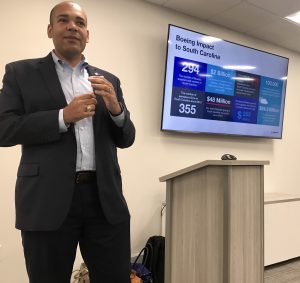Boeing to Educators: “Our Number One Priority is Building Our Future Workforce”
May 13, 2019By Tia Williams Nelson
On May 9th, Boeing National Strategy and Engagement Director Tommy Preston returned from North Charleston to his long-time home in the Capital City with an important message for state and regional educators: “[Boeing’s] number one priority here in South Carolina is building our future workforce”.
Preston believes Boeing is capitalizing on a series of economic events primarily attributed to the advanced manufacturing leaders who came before them. Referencing BMW, Volvo, Jushi, and now an expanding string of subsequent high-growth suppliers and vendors, Preston confirms confidently, “the future is built here”.
Boeing is conducting a series of state visits and discussions to affirm their regional growth commitment while encouraging partnership on future workforce development initiatives. They conclude the following impact of investments since breaking ground in 2009.
- $2 Billion- Amount invested in infrastructure for Boeing services since 2009
- 294- The number of Boeing suppliers and vendors in South Carolina
- 355- The current number of aerospace firms in the state since 2010
- 13- The number of additional jobs created elsewhere in the state economy for every 10 aerospace private sector jobs
- $48 Million- Total charitable giving in state non-profits since 2010
- $355 Million- Amount Boeing spends with suppliers and vendors in South Carolina annually
- 100,000- Total number of jobs supported by the aerospace industry in South Carolina
- $24.8 Billion- Total economic impact of aerospace in the state
With a historic and deep-rooted textile manufacturing base, the South Carolina workforce is ideal for advanced industry initiatives. More currently, Boeing is pursuing innovative materials and methods for construction of their 787 Dreamliner and airplanes of the future. As a result, nearly half of the 787 airframe is comprised of carbon fiber reinforced plastic and other composites. This use of composite materials makes the plane lighter, and ultimately faster and more economically efficient for Boeing customers. Japanese firms Toray and Teijin are just two companies recently locating in the state to serve Boeing as carbon fiber manufacturers.
To continue innovating, Boeing realizes it must be bold in its quest to train and equip the future workforce to meet future demand. Together with groups like the Midlands Education Business Alliance (MEBA), SC Department of Commerce, ReadySC and many other public-private partners, Boeing has prioritized and is implementing the following vision objectives: “Our Future”, servicing K-12 and building the talent pipeline, “Our Heroes”, workforce transition for veterans with current veteran employment rate of 20%, and “Our Homes”, specific initiatives to boost student nutritional health and general land conservation.
Preston noted that of the 7000 employees in the North Charleston facility, a majority of employees are production staff with less than four years of higher education. He emphasized the importance of their partnerships with ReadySC and the technical colleges to provide these employees with on the job training. After one year full time work at the company, all employees have opportunity for 100% paid tuition reimbursement for further education at all levels. Additionally, Boeing participates in ApprenticeshipSC, youth internships and numerous career fairs and “signing days”, all projects heavily administered and funded by public-private groups like MEBA and other state business/education alliances.
On April 9th, Boeing presented the 3rd annual South Carolina STEM (Science Technology Engineering Math) “signing day” at the South Carolina State House, where they recognized 50 total students and 6 Midlands students for their commitment to pursue a two or four year degree in the STEM field after high school.
Preston concluded his conversation to educators by passionately emphasizing Boeing’s commitment to diversity in the workforce, as well as “diversity of thought”. The aeronautical manufacturer has made great efforts to intentionally pursue relationships with Historically Black Colleges and Universities (HBCUs) in their recruitment efforts, hiring more than 1,800 graduates in the past four years. Such efforts seem to be impacting the diversity in leadership among the company as well, as Preston noted, “at one point you could count on one hand the people of color in senior management [at Boeing], now there are too many to count”.
In answering crowd questions about the recent news surrounding the 737 Max fatal crashes and subsequent groundings, Preston said that he reminds his colleagues to remain positive and look for opportunities to grow personally and as a team. He believes the company mission and focus on excellence will guide the company through this challenge and others to come.
Tia Nelson is Director of Communications and Development at Columbia World Affairs Council. She has a masters in Urban and Regional Planning with a Certificate in Economic Development from Virginia Tech as well as 10+ years of combined experience in franchise executive management, city development and publishing. She is the original founder/ CEO of Midlands Anchor and is currently President of a volunteer-run community collective called The Anchor Institute.



















